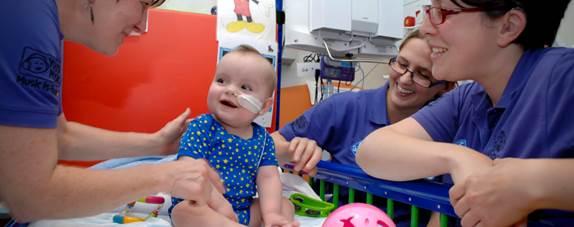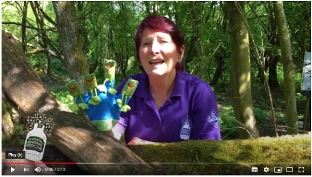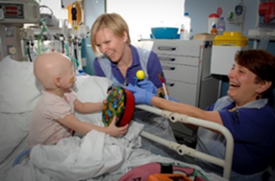
During this unprecedented time, we have all experienced increased isolation with many experiencing a degree of anxiety, unable to see our friends and family for what may be the first time in our lives; but for many of the children and young people at Birmingham Children's Hospital this is a familiar daily reality.
For the last 15 years Ex Cathedra’s Singing Medicine team has helped combat isolation, as well as supporting the improvement of the mental health and wellbeing of these children; but once the pandemic ensued - lockdown meant the usual weekly visits stopped!
In an extraordinary piece of timing, UK leading choir Ex Cathedra was working with Singing Medicine patients and Birmingham Children’s Hospital Chaplaincy Team before anyone had heard of coronavirus, to create what is thought to be the world’s first hospital-wide children and young people’s virtual patient choir, called the Lifting Spirits Choir. Their first film, the incredibly moving Music Inside was released at the beginning of June.
Speaking about this unique film, Rebecca Ledgard, Ex Cathedra’s Director of Education explains:
“Our Singing Medicine team is absolutely passionate about bringing the emotional and physical wellbeing of singing-play to children in hospital. We hope that as you see the happiness on the faces of the original choir members, you too will have your spirits lifted. The skills of our recording and video editing team, we think, has produced something inspiring and hopeful for our time. We look forward to sharing it with future patients for them to join in with and feel they belong as a part of this unique choir”.
Research has shown that singing releases the body’s natural opioids and hormones associated with wellbeing such as oxytocin, and reduces cortisol (stress), it stimulates the brain and the deeper breathing required connects people to their core.
Singing also helps reduce anxiety, can distract the mind, avoiding over-worrying or over-thinking, can enable you to feel happier, more relaxed and at peace, as these significant benefits play a central role in our psychological health.
‘When the Singing Medicine team arrive on the ward it is like turning a light on’ (Chaplain, Birmingham Children’s Hospital)
Whilst the team are not able to visit the wards, they are making interactive singing-play films for children and young people now isolated everywhere. There are now over 130 Singing Medicine interactive films available, free to access on YouTube, for the patients, and for all young children and families everywhere. The musicians also live-stream on Facebook every Friday from their homes.
Ex Cathedra’s singing-play repertoire is written by its own team for specific wellbeing and play purposes, and to enable all children and adolescents, whatever their capabilities, illness, situation, language, background, and needs, to play. Enabling decision-making and children being at the centre of the play are key aspects of the repertoire and sessions. The team are responsive to individual needs and requests whether from child, family or staff member – doctor, physio or nurse. A new pilot scheme is underway, making Singing Medicine Postcards. These c.4 minute films are made for a particular child. The play-worker and staff on the intensive care unit decide who would benefit from additional intervention, with enough [confidential] information given to the team, to ensure to make the most appropriate, accessible, engaging film as possible for each individual. Sometimes it’s blowing bubbles, or wiggling tongues or just blinking eyes – but each song is created especially for that child, with little gaps for them to join in. A Singing Medicine Postcard has also been made for a family who were memory-making for their child who was to have life support removed.
‘She’s so chilled from that. And her heart rate calmed right down. Look at the monitor! It happened right when you were singing.” Mum
‘A child in a lot of pain and distress was offered painkillers and then calmed down so much during the singing session that they were not necessary at that time.’ Nurse
‘Music has been helpful for us to get closer to him because at one point he pushed us away…Singing Medicine gave us the chance to do something together again as a family.’ Parent
Singing Medicine is possible thanks to support from Birmingham Children’s Hospital Charities, and from many trusts including major donations from the Oak Foundation, Froebel Trust, and Masonic Charitable Foundation. There are many opportunities for the business community to partner the project. For more information contact Rebecca Ledgard: [email protected] or Julie Watson, Grants & Individual Giving Manager: [email protected]
You can learn more about the project at www.singingmedicine.co.uk
Notes
Ex Cathedra, based in Birmingham is a leading UK choir. Founded by Artistic Director Jeffrey Skidmore OBE, it is currently celebrating its 50th anniversary.
Ex Cathedra’s Singing Medicine project brings the very special wellbeing benefits of singing-play to babies, children and teenagers, many of whom are extremely poorly, and some of whom are in hospital for extremely long periods at Birmingham Children’s Hospital.
Under normal circumstances, every Friday, working in pairs, the team go to every unit, visiting bedside in wards and isolation rooms - including in intensive care - to work with children and families. Singing Medicine was created especially for Birmingham Children’s Hospital and since 2004 we have delivered circa 40,000 sessions. The project has also been delivered at Great Ormond Street, Warwick, John Radcliffe and Heartlands Hospitals. The team has presented the project at many national conferences and also taken it to New Zealand and Singapore.
Awarded Outstanding Contribution to the Field of Arts in Health by Royal Society for Public Health, 2011.
Research conducted by Dr Carolyn Blackburn from Birmingham City University (2019) found:
“…participating in Singing Medicine provides health, wellbeing and emotional benefits for children, their families and the NHS professionals working in the hospital. It contributes to children’s learning and development (including neurodevelopment), family relationships and experiences of their hospital stay, provides a distraction from pain and discomfort, and provides positive memories for families if the worst happens and children do not recover.”


